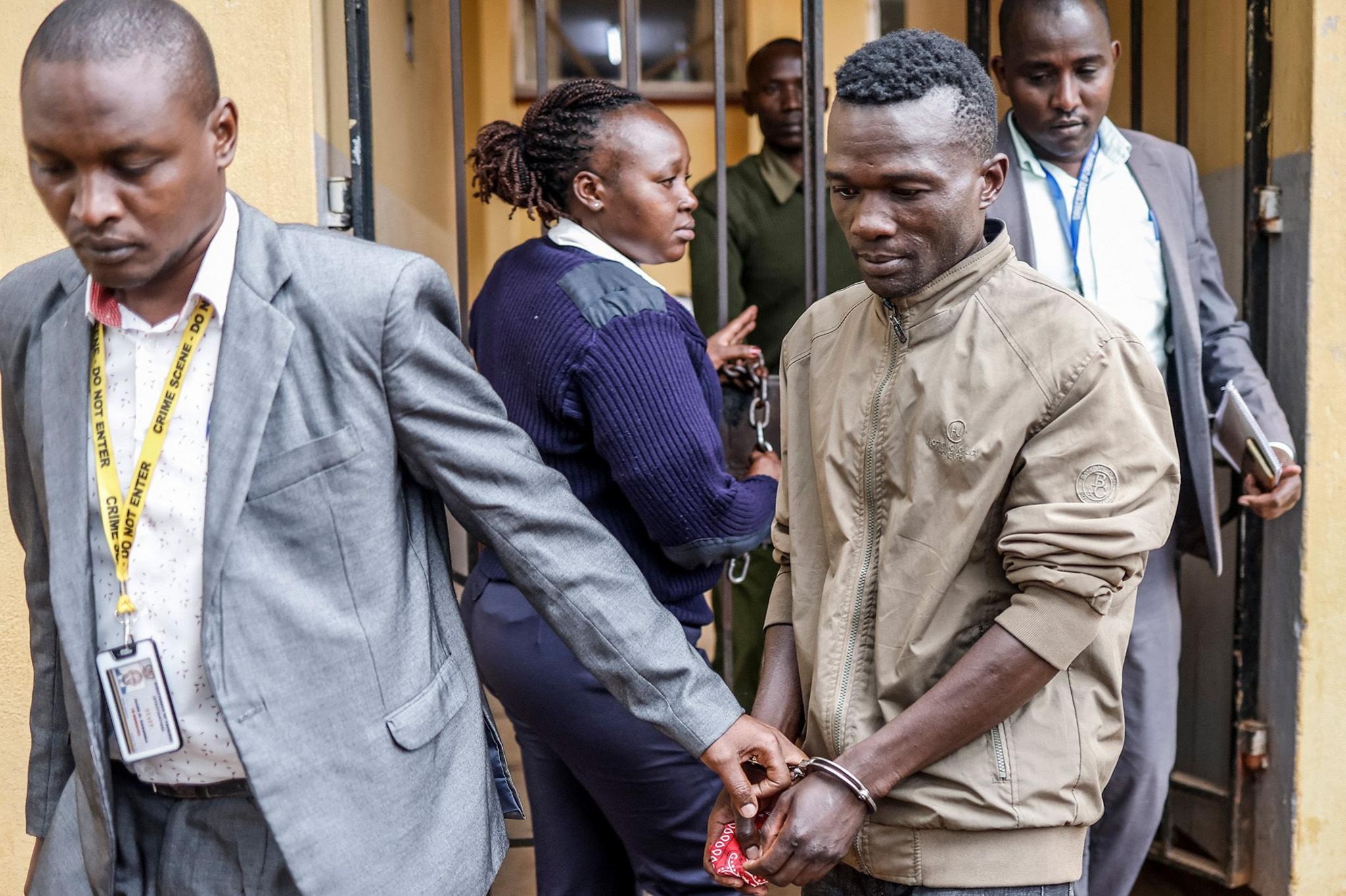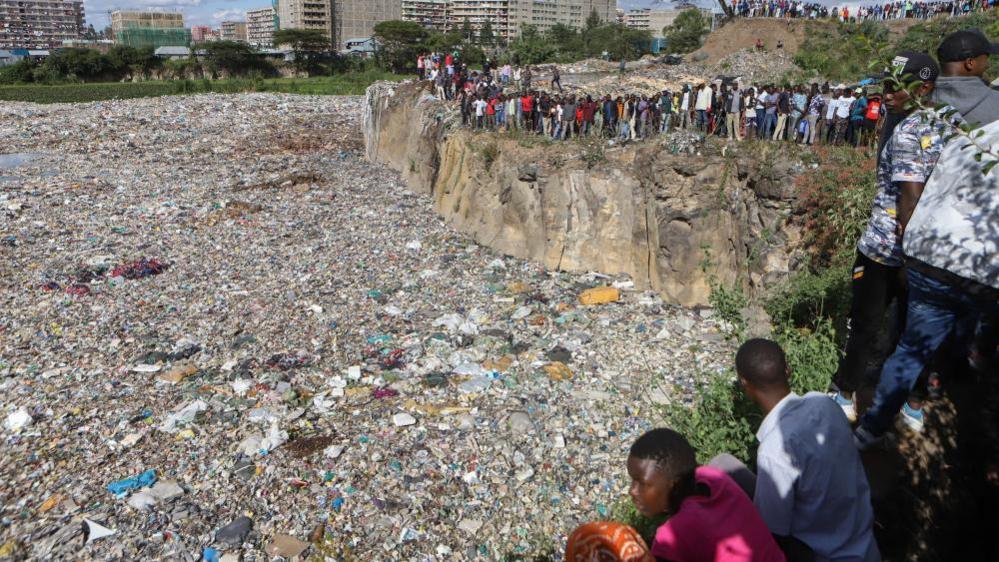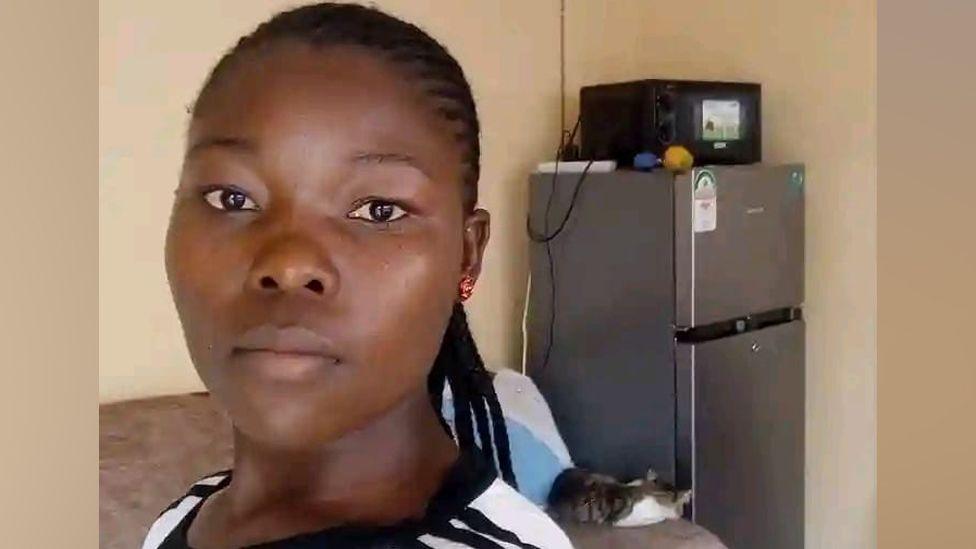Kenya's ‘serial killer’ mystery - five key questions

- Published
The arrest of an alleged serial killer in Kenya has shocked the country - but many have serious questions about the circumstances of his arrest.
Police say Collins Jumaisi Khalusha, 33, confessed to killing 42 women - though his lawyer told a court on Tuesday he was tortured into a confession.
It is the latest twist in a perplexing story that followed the recent discovery of the dismembered remains of nine bodies wrapped in plastic at a disused quarry, which is used as rubbish tip and is close to a police post in the capital, Nairobi.
1) How did the bodies end up metres from a police post?
Many people are finding it hard to understand that the police were unable to detect that bodies were being left around 100m (109 yards) from one of their offices in the informal settlement of Mukuru Kwa Njenga.
Residents have criticised officers for their “laxity and unprofessionalism” in dealing with the crime.
In response, acting police chief Douglas Kanja announced on Sunday that the officers from Kware police post near the scene had been transferred.
It is not clear whether they have been questioned over how the deaths went unnoticed.
But given the force's poor human rights record, the police watchdog said it was undertaking a preliminary investigation to establish whether there was any police connection.

The operation to retrieve the bodies from the quarry attracted a large crowd
What is even more baffling is how a member of the public came to discover them.
The family of Josephine Owino, who had gone missing, says she came to one of them "in a dream" and helped point them in the right direction.
Diana Keya, Ms Owino’s cousin, told Citizen TV that the family then paid some young men near the rubbish tip to comb through the debris.
That was how nine severely mutilated bodies were found on Friday. They were wrapped in nylon bags, which were tied with rope.
The first statement by police said the “alarm was raised” by the public.
When questioned later the head of the Directorate of Criminal Investigations Mohamed Amin said: “We are not dreamers and we do not believe in dreams.”
2) Over what time period had the bodies been left?
Police said the bodies recovered were in different stages of decomposition, suggesting that the victims had been killed at different times.
In the now-disputed confession, the police say Mr Khalusha allegedly admitted to murdering the women over a period of two years.
What is not clear, though, is whether the remains had been dumped over that time or more recently.
Hussein Khalid, the executive director of rights group Haki Africa, told the BBC that the police's version of events had “a lot of loopholes”.
3) How did the police make the arrest so fast?
After not apparently suspecting anything for two years the police then made an arrest in less than three days after the discovery of the bodies.
On Monday, police said Mr Khalusha was detained at a bar in the small hours of that morning while watching the Euro final football match.
They displayed to the media some of the items said to have been recovered from the suspect’s house - also close to where the bodies were found - including 10 phones, a laptop, identity cards and personal female clothing.
The police said they had traced Mr Khalusha’s whereabouts after geo-locating the mobile phone of one of his alleged victims.
Mr Khalusha’s lawyer has questioned the validity of the evidence.
4) Who are the victims?
Only one body has been identified so far - that of 24-year-old Roseline Ongogo.
Her brother Emmanuel Ongogo told the BBC she went missing on 28 June after she left the house to look for casual work.
He said the family went to the morgue when they heard bodies had been recovered from Mukuru.
They identified her as she in the same clothes she had disappeared wearing and had the same hairstyle.

Roseline Ongogo's family had been looking for her for more than two weeks
The police also allege that Mr Khalusha's wife was his first victim and say her identity card was found among the belongings of other alleged victims.
The family of Ms Owino, who said they dreamt about her whereabouts, told the BBC they were still waiting for an identification.
5) What are the police saying about women’s safety in Kenya?
The discovery has brought back memories of the brutal murder of 20-year-old Rita Waeni in January.
Her dismembered body was found at a short-term rental apartment in Nairobi. The case is yet to be solved.
The death triggered nationwide demonstrations against the rising cases of femicide and other violence against women.
Amnesty International said more than 500 cases of femicide were recorded in Kenya between 2016 and 2023.
All the bodies recovered from the rubbish tip are female.
A handful of elected women leaders who converged at morgue asked the government to speed up the investigations and put an end to such violence.
When asked what the police were doing to address cases of femicide and violence against women, spokesperson Resila Onyango said she could not address that issue specifically - but she told the BBC that the work of the police was “to protect life and property of everyone”.
This scrutiny of the police comes as more Kenyan officers arrive in Haiti, where they are leading an international mission to tackle the country's powerful gangs.
Lobby groups in Port-au-Prince have previously questioned the credibility of the officers over claims of brutality and extra-judicial killings, which Kenya's government has always denied.
More Kenya stories from the BBC:

Go to BBCAfrica.com, external for more news from the African continent.
Follow us on Twitter @BBCAfrica, external, on Facebook at BBC Africa, external or on Instagram at bbcafrica, external